Intuitive Gestaltung
Dank nativ integriertem Gutenberg Editor
Die GREYD.SUITE ist die einzige All-in-one Lösung, die den neuen Editor von WordPress vollständig integriert hat. Die nativen Funktionen haben wir an vielen Stellen erweitert und um starke GREYD.SUITE Features ergänzt. Das Design gestaltest du global für die gesamte Website im Customizer.
Dynamic Templates mobil optimiert
Probiere einmal aus, dein Browser-Fenster zu verkleinern und sieh, wie sich dieser Bereich verändert. Wie das funktioniert?
Mit den Dynamic Templates der GREYD.SUITE! Damit kannst du verschiedene Layouts für jeden Breakpoint erstellen, musst deine Inhalte aber trotzdem nur einmal eingeben.
Dynamic Templates mobil optimiert
Probiere einmal aus, dein Browser-Fenster zu verkleinern und sieh, wie sich dieser Bereich verändert. Wie das funktioniert?
Mit den Dynamic Templates der GREYD.SUITE! Damit kannst du verschiedene Layouts für jeden Breakpoint erstellen, musst deine Inhalte aber trotzdem nur einmal eingeben.
Dynamic Templates mobil optimiert
Probiere einmal aus, dein Browser-Fenster zu verkleinern und sieh, wie sich dieser Bereich verändert. Wie das funktioniert?
Mit den Dynamic Templates der GREYD.SUITE! Damit kannst du verschiedene Layouts für jeden Breakpoint erstellen, musst deine Inhalte aber trotzdem nur einmal eingeben.
Dynamic Templates mobil optimiert
Probiere einmal aus, dein Browser-Fenster zu verkleinern und sieh, wie sich dieser Bereich verändert. Wie das funktioniert?
Mit den Dynamic Templates der GREYD.SUITE! Damit kannst du verschiedene Layouts für jeden Breakpoint erstellen, musst deine Inhalte aber trotzdem nur einmal eingeben.
GREYD.Popups
Automatisierte Pop-ups im Design deiner Seite
Mit dem integrierten Pop-up Builder gestaltest du einzigartige Pop-ups automatisch im Design deiner Website. Dir stehen unterschiedlichste Auslöser, Animationen, Regeln und Module zur Verfügung.
GREYD.Hub
Alle deine Projekte in einem Backend
Egal wie viele Seiten deine Installation enthält: Im GREYD.Hub kannst du alle deine Seiten zentral verwalten, mit nur einem Klick Inhalte, Designs oder ganze Seiten importieren und exportieren sowie Back-ups übersichtlich verwalten.
GREYD.Forms
Professionelle Formulare erstellen
Ob einfaches Kontaktformular mit Double Opt-in, Conversion-optimiertes Lead-Formular oder komplexe Multistep-Formulare mit CRM-Anbindung und mathematischen Berechnungen – mit GREYD.Forms brauchst du keine zusätzlichen Plugins!
Dynamic Templates
Nutze die ganze Power von WordPress
Mit Dynamic Templates reduzierst du den Aufwand für Aufbau und Pflege deiner Seite massiv und kannst Inhalte von Redakteuren ohne WordPress Kenntnisse pflegen lassen.
„It’s not an experiment if you know it’s going to work.”
Jeff Bezos
Mehr als nur Beiträge
Individuelle Beitragstypen
Ob Standorte, Mitarbeiter oder FAQ: Die GREYD.SUITE macht dir das Erstellen von Custom Post Types und Custom Taxonomies maximal einfach. Vereinfache die Datenpflege im Back-end und gestalte deine Inhalte flexibel.
Zeige deine Custom Post Types in Post Übersichten mit beliebigem Layout:
_topic_
_question_
MULTICLIMACT presented advancements in Building Information Modelling, sensors, and digital technologies for enhancing built environment resilience at IEEE MetroLivEnv 2024 in Greece. Zamora has won the Best Conference Paper Award.
CRETE, Greece. 14 June 2024 – As part of the IEEE MetroLivEnv 2024 conference, held on June 12-14 in Chania, Crete, Greece, the MULTICLIMACT project hosted an insightful special session focusing on the convergence of Building Information Modelling BIM, sensors, and digital technologies. Special Session titled “Building Information Modelling, Sensors, and Digital Technologies: Towards the Development of Multidomain Platforms to Monitor the Built Environment,” showcased cutting-edge research aimed at enhancing the resilience and performance of built environments.
Chaired by Prof. Gloria Cosoli, Prof. Marco Arnesano, and Prof. Gian Marco Revel, the session highlighted the latest advancements in monitoring solutions designed to improve the built environment’s response to natural hazards. The discussion centered on sensors, measurement procedures, and digital technologies that enrich BIM data, ultimately aiming to enhance building monitoring capabilities and overall performance.
Key Presentations:
The session featured five notable papers, three of which were directly related to the MULTICLIMACT project:
Advancing Resilience of the Built Environment by Digital and Measurement Technologies
- Presenter: Prof. Gian Marco Revel, Università Politecnica delle Marche
- Summary: Prof. Revel discussed the integration of digital and measurement technologies to bolster the resilience of the built environment. His presentation underscored the importance of these technologies in enhancing building performance and adaptability to environmental challenges.
Modular Real-Time Monitoring System Architecture for Materials and Technologies to Improve Urban Heat-Island Effect and Water Runoff in HE MULTICLIMACT
- Presenter: Eng. Diego Zamora Sánchez, TECNALIA
- Summary: Eng. Zamora introduced a modular real-time monitoring system architecture designed to mitigate the urban heat-island effect and manage water runoff. His talk highlighted the system’s potential to significantly improve urban resilience and sustainability. Zamora has won the Best Conference Paper Award with his presentation. The paper was co-authored by Diego Zamora Sánchez and Alberto Armijo of TECNALIA and in collaboration with researchers from COMSA and NATURALEA.
Measuring the Occupants’ Well-Being in the Built Environment: Towards the Integration of Physiological and Environmental Parameters in a Multidomain BIM-Based Platform
- Presenter: Prof. Gloria Cosoli, Università Telematica eCampus & Università Politecnica delle Marche
- Summary: Prof. Cosoli’s presentation focused on the integration of physiological and environmental parameters into a multidomain BIM-based platform. She emphasized the significance of monitoring occupants’ well-being to enhance overall building performance and occupant comfort.
These presentations provided valuable insights into the ongoing research and development within the MULTICLIMACT project, highlighting the project’s commitment to advancing built environment monitoring through innovative technologies.
Stay tuned to MULTICLIMACT for more updates on our efforts to create resilient, sustainable, and high-performing built environments through cutting-edge technology and research.
Author: Prof. Gloria Cosoli, UNIVPM
_topic_
_question_
MULTICLIMACT presented advancements in Building Information Modelling, sensors, and digital technologies for enhancing built environment resilience at IEEE MetroLivEnv 2024 in Greece. Zamora has won the Best Conference Paper Award.
CRETE, Greece. 14 June 2024 – As part of the IEEE MetroLivEnv 2024 conference, held on June 12-14 in Chania, Crete, Greece, the MULTICLIMACT project hosted an insightful special session focusing on the convergence of Building Information Modelling BIM, sensors, and digital technologies. Special Session titled “Building Information Modelling, Sensors, and Digital Technologies: Towards the Development of Multidomain Platforms to Monitor the Built Environment,” showcased cutting-edge research aimed at enhancing the resilience and performance of built environments.
Chaired by Prof. Gloria Cosoli, Prof. Marco Arnesano, and Prof. Gian Marco Revel, the session highlighted the latest advancements in monitoring solutions designed to improve the built environment’s response to natural hazards. The discussion centered on sensors, measurement procedures, and digital technologies that enrich BIM data, ultimately aiming to enhance building monitoring capabilities and overall performance.
Key Presentations:
The session featured five notable papers, three of which were directly related to the MULTICLIMACT project:
Advancing Resilience of the Built Environment by Digital and Measurement Technologies
- Presenter: Prof. Gian Marco Revel, Università Politecnica delle Marche
- Summary: Prof. Revel discussed the integration of digital and measurement technologies to bolster the resilience of the built environment. His presentation underscored the importance of these technologies in enhancing building performance and adaptability to environmental challenges.
Modular Real-Time Monitoring System Architecture for Materials and Technologies to Improve Urban Heat-Island Effect and Water Runoff in HE MULTICLIMACT
- Presenter: Eng. Diego Zamora Sánchez, TECNALIA
- Summary: Eng. Zamora introduced a modular real-time monitoring system architecture designed to mitigate the urban heat-island effect and manage water runoff. His talk highlighted the system’s potential to significantly improve urban resilience and sustainability. Zamora has won the Best Conference Paper Award with his presentation. The paper was co-authored by Diego Zamora Sánchez and Alberto Armijo of TECNALIA and in collaboration with researchers from COMSA and NATURALEA.
Measuring the Occupants’ Well-Being in the Built Environment: Towards the Integration of Physiological and Environmental Parameters in a Multidomain BIM-Based Platform
- Presenter: Prof. Gloria Cosoli, Università Telematica eCampus & Università Politecnica delle Marche
- Summary: Prof. Cosoli’s presentation focused on the integration of physiological and environmental parameters into a multidomain BIM-based platform. She emphasized the significance of monitoring occupants’ well-being to enhance overall building performance and occupant comfort.
These presentations provided valuable insights into the ongoing research and development within the MULTICLIMACT project, highlighting the project’s commitment to advancing built environment monitoring through innovative technologies.
Stay tuned to MULTICLIMACT for more updates on our efforts to create resilient, sustainable, and high-performing built environments through cutting-edge technology and research.
Author: Prof. Gloria Cosoli, UNIVPM
_topic_
_question_
Dr. Clemente Fuggini, coordinator of the MULTICLIMACT project, delivered a captivating address at the KEY Conference, focusing on enhancing resilience against climate change in the built environment. His insights illuminated the project’s pivotal role in driving sustainable innovation.
RIMINI, Italy. 28 February 2024 – At the “Built4People” event hosted by the KEY Conference, the spotlight shone brightly on initiatives aimed at transforming the built environment for a sustainable future. Among the distinguished speakers was Dr. Clemente Fuggini, the coordinator of the MULTICLIMACT project, who delivered a compelling address on enhancing resilience against climate change.
Co-chaired by Prof. Gian Marco Revel and Marco Caffi, the event delved into the Public Private Partnership of the EU Commission, “Built4People,” a pivotal initiative driving innovation and sustainability in construction. Representatives from the EU Commission convened to discuss the program’s agenda, with a specific focus on projects dedicated to urban regeneration, energy efficiency, and improving people’s well-being and safety within built environments.
Dr. Fuggini’s presentation on the MULTICLIMACT project was a highlight of the conference. He elucidated on strategies to bolster the resilience of infrastructure in the face of climate change challenges. His insights shed light on innovative approaches and technologies crucial for mitigating the impacts of environmental shifts on buildings and communities.
“Building resilience in the face of climate change is not just a necessity; it’s our duty. Through initiatives like MULTICLIMACT, we’re not just constructing buildings; we’re shaping a sustainable future for generations to come.” said Dr. Fuggini.
The event featured a diverse lineup of presentations, including discussions on the opportunities presented by the Horizon Europe program, the role of the B4P partnership in revolutionizing the construction sector, and the transition from groundbreaking projects to viable market solutions.
Alessandro Lodigiani and Luigi Perrisich also contributed valuable perspectives on driving innovation forward, emphasizing the importance of collaborative networks and innovative clusters in accelerating progress within the industry. The discourse at the KEY Conference underscored the urgency of embracing sustainable practices in construction and urban development. With initiatives like MULTICLIMACT at the forefront, stakeholders are poised to usher in a new era of resilience and sustainability in the built environment, paving the way for a brighter, greener future.
_topic_
_question_
Dr. Clemente Fuggini, coordinator of the MULTICLIMACT project, delivered a captivating address at the KEY Conference, focusing on enhancing resilience against climate change in the built environment. His insights illuminated the project’s pivotal role in driving sustainable innovation.
RIMINI, Italy. 28 February 2024 – At the “Built4People” event hosted by the KEY Conference, the spotlight shone brightly on initiatives aimed at transforming the built environment for a sustainable future. Among the distinguished speakers was Dr. Clemente Fuggini, the coordinator of the MULTICLIMACT project, who delivered a compelling address on enhancing resilience against climate change.
Co-chaired by Prof. Gian Marco Revel and Marco Caffi, the event delved into the Public Private Partnership of the EU Commission, “Built4People,” a pivotal initiative driving innovation and sustainability in construction. Representatives from the EU Commission convened to discuss the program’s agenda, with a specific focus on projects dedicated to urban regeneration, energy efficiency, and improving people’s well-being and safety within built environments.
Dr. Fuggini’s presentation on the MULTICLIMACT project was a highlight of the conference. He elucidated on strategies to bolster the resilience of infrastructure in the face of climate change challenges. His insights shed light on innovative approaches and technologies crucial for mitigating the impacts of environmental shifts on buildings and communities.
“Building resilience in the face of climate change is not just a necessity; it’s our duty. Through initiatives like MULTICLIMACT, we’re not just constructing buildings; we’re shaping a sustainable future for generations to come.” said Dr. Fuggini.
The event featured a diverse lineup of presentations, including discussions on the opportunities presented by the Horizon Europe program, the role of the B4P partnership in revolutionizing the construction sector, and the transition from groundbreaking projects to viable market solutions.
Alessandro Lodigiani and Luigi Perrisich also contributed valuable perspectives on driving innovation forward, emphasizing the importance of collaborative networks and innovative clusters in accelerating progress within the industry. The discourse at the KEY Conference underscored the urgency of embracing sustainable practices in construction and urban development. With initiatives like MULTICLIMACT at the forefront, stakeholders are poised to usher in a new era of resilience and sustainability in the built environment, paving the way for a brighter, greener future.
_topic_
_question_
23 European organisations meet in Milan to launch the EU-funded project MULTICLIMACT, a novel European action to usher in a new era of resilience and sustainability against local natural and climatic hazards.
MILAN, 25 October 2023 – Today marks the unveiling of an ambitious and innovative European project, MULTICLIMACT, designed to revolutionize the protection of the built environment against locally relevant natural and climatic hazards. This collaborative initiative is set to advance resilience, sustainability, and safety for communities throughout the European region.
As climatic conditions have changed significantly, especially within the last few decades, and the frequency of extreme events such as floods, earthquakes and severe heat waves is increasing, there is an urgent need to plan, design, and retrofit the built environment to adapt to current and future risks.
In a rapidly changing world, where climate change and localized natural hazards pose an increasing threat to our cities and infrastructure, MULTICLIMACT stands as a beacon of progress and hope. This project, funded by the European Union and involving a consortium of leading experts and institutions across Europe, aspires to develop cutting-edge strategies and technologies as well as a toolkit with 18 reliable and easy to implement methods and digital solutions to enhance the resilience of our urban landscapes.
The toolkit will be tested at four pilot sites in Italy, Spain, Latvia and The Netherlands. The locations all have different climatic conditions and are therefore susceptible to different types of climate-related environmental disasters.
Key objectives of the MULTICLIMACT project include:
- Innovative Risk Assessment and Prediction: The project will harness the latest advancements in data analytics, modelling, and predictive technologies to better anticipate and respond to natural and climatic threats.
- Cross-Disciplinary Collaboration: MULTICLIMACT brings together experts from diverse fields such as architecture, engineering, climatology, and disaster management to ensure a holistic approach to resilience-building.
- Community Engagement and Education: The project is dedicated to fostering public awareness and engagement, empowering communities to take an active role in safeguarding their built environment.
Dr. Clemente Fuggini, the project lead and an esteemed expert in the field of infrastructure engineering, expressed his enthusiasm, stating, “MULTICLIMACT is not just a project; it’s a shared vision for a safer, more resilient future for our communities. We are excited to bring together the best minds in Europe to drive innovation and make a tangible difference in the face of the growing challenges posed by climate change. Through this effort, we will create a framework and tool for assessing resilience at various scales and to enhance preparedness and responsiveness.“
The project is set to run over the next 3,5 years, during which a series of pilot programs and research initiatives will be conducted to achieve the stated objectives. The project consortium includes renowned institutions known for their expertise in resilience, sustainability, and climate adaptation:
RINA CONSULTING SPA, Genova, Italy
AGENZIA NAZIONALE PER LE NUOVE TECNOLOGIE, L’ENERGIA E LO SVILUPPO ECONOMICO SOSTENIBILE, Lungotevere, Italy
UNIVERSITA POLITECNICA DELLE MARCHE, Ancona, Italy
UNIVERSITA DEGLI STUDI DI CAMERINO, Camerino, Italy
FONDAZIONE CENTRO EURO-MEDITERRANEOSUI CAMBIAMENTI CLIMATICI, Lecce, Italy
COMUNE DI CAMERINO, Camerino, Italy
LIVE INFORMATION SYSTEM SRL, Jesi, Italy
ICLEI EUROPEAN SECRETARIAT GMBH, Freiburg im Breisgau, Germany
UNIVERSITAETSKLINIKUM AACHEN, Aachen, Germany
STEINBEIS INNOVATION GGMBH, Stuttgart, Germany
FIBRISTERRE SYSTEMS GMBH, Berlin, Germany
TECHNISCHE UNIVERSITEIT DELFT, Delft, The Netherlands
FUNDACION TECNALIA RESEARCH & INNOVATION, Derio Bizkaia, Spain
COMSA SAU, Barcelona, Spain
CYPE SOFT SL, Alicante, Spain
BRIGAID CONNECT, Lasrozas, Spain
NATURALEA CONSERVACIO, SL, Castellar del Valles, Spain
AJUNTAMENT DE BARCELONA, Barcelona, Spain
KUNGLIGA TEKNISKA HOEGSKOLAN, Stockholm, Sweden
UPONOR OYJ, Vantaa, Finland
RIGA MUNICIPAL AGENCY “RIGA ENERGY AGENCY”, Riga, Latvia
NATIONAL CENTER FOR SCIENTIFIC RESEARCH “DEMOKRITOS”, Agia Paraskevi, Greece
UNIVERSIDADE DO MINHO, Braga, Portugal
Project Coordinator
Clemente Fuggini, RINA Consulting Spa
Main Press Contact
Alparslan Akkus, Steinbeis Europa Zentrum
_topic_
_question_
23 European organisations meet in Milan to launch the EU-funded project MULTICLIMACT, a novel European action to usher in a new era of resilience and sustainability against local natural and climatic hazards.
MILAN, 25 October 2023 – Today marks the unveiling of an ambitious and innovative European project, MULTICLIMACT, designed to revolutionize the protection of the built environment against locally relevant natural and climatic hazards. This collaborative initiative is set to advance resilience, sustainability, and safety for communities throughout the European region.
As climatic conditions have changed significantly, especially within the last few decades, and the frequency of extreme events such as floods, earthquakes and severe heat waves is increasing, there is an urgent need to plan, design, and retrofit the built environment to adapt to current and future risks.
In a rapidly changing world, where climate change and localized natural hazards pose an increasing threat to our cities and infrastructure, MULTICLIMACT stands as a beacon of progress and hope. This project, funded by the European Union and involving a consortium of leading experts and institutions across Europe, aspires to develop cutting-edge strategies and technologies as well as a toolkit with 18 reliable and easy to implement methods and digital solutions to enhance the resilience of our urban landscapes.
The toolkit will be tested at four pilot sites in Italy, Spain, Latvia and The Netherlands. The locations all have different climatic conditions and are therefore susceptible to different types of climate-related environmental disasters.
Key objectives of the MULTICLIMACT project include:
- Innovative Risk Assessment and Prediction: The project will harness the latest advancements in data analytics, modelling, and predictive technologies to better anticipate and respond to natural and climatic threats.
- Cross-Disciplinary Collaboration: MULTICLIMACT brings together experts from diverse fields such as architecture, engineering, climatology, and disaster management to ensure a holistic approach to resilience-building.
- Community Engagement and Education: The project is dedicated to fostering public awareness and engagement, empowering communities to take an active role in safeguarding their built environment.
Dr. Clemente Fuggini, the project lead and an esteemed expert in the field of infrastructure engineering, expressed his enthusiasm, stating, “MULTICLIMACT is not just a project; it’s a shared vision for a safer, more resilient future for our communities. We are excited to bring together the best minds in Europe to drive innovation and make a tangible difference in the face of the growing challenges posed by climate change. Through this effort, we will create a framework and tool for assessing resilience at various scales and to enhance preparedness and responsiveness.“
The project is set to run over the next 3,5 years, during which a series of pilot programs and research initiatives will be conducted to achieve the stated objectives. The project consortium includes renowned institutions known for their expertise in resilience, sustainability, and climate adaptation:
RINA CONSULTING SPA, Genova, Italy
AGENZIA NAZIONALE PER LE NUOVE TECNOLOGIE, L’ENERGIA E LO SVILUPPO ECONOMICO SOSTENIBILE, Lungotevere, Italy
UNIVERSITA POLITECNICA DELLE MARCHE, Ancona, Italy
UNIVERSITA DEGLI STUDI DI CAMERINO, Camerino, Italy
FONDAZIONE CENTRO EURO-MEDITERRANEOSUI CAMBIAMENTI CLIMATICI, Lecce, Italy
COMUNE DI CAMERINO, Camerino, Italy
LIVE INFORMATION SYSTEM SRL, Jesi, Italy
ICLEI EUROPEAN SECRETARIAT GMBH, Freiburg im Breisgau, Germany
UNIVERSITAETSKLINIKUM AACHEN, Aachen, Germany
STEINBEIS INNOVATION GGMBH, Stuttgart, Germany
FIBRISTERRE SYSTEMS GMBH, Berlin, Germany
TECHNISCHE UNIVERSITEIT DELFT, Delft, The Netherlands
FUNDACION TECNALIA RESEARCH & INNOVATION, Derio Bizkaia, Spain
COMSA SAU, Barcelona, Spain
CYPE SOFT SL, Alicante, Spain
BRIGAID CONNECT, Lasrozas, Spain
NATURALEA CONSERVACIO, SL, Castellar del Valles, Spain
AJUNTAMENT DE BARCELONA, Barcelona, Spain
KUNGLIGA TEKNISKA HOEGSKOLAN, Stockholm, Sweden
UPONOR OYJ, Vantaa, Finland
RIGA MUNICIPAL AGENCY “RIGA ENERGY AGENCY”, Riga, Latvia
NATIONAL CENTER FOR SCIENTIFIC RESEARCH “DEMOKRITOS”, Agia Paraskevi, Greece
UNIVERSIDADE DO MINHO, Braga, Portugal
Project Coordinator
Clemente Fuggini, RINA Consulting Spa
Main Press Contact
Alparslan Akkus, Steinbeis Europa Zentrum
alparslan.akkus@steinbeis-europa.de
_topic_
_question_
MULTICLIMACT partners focusing on innovative materials and sensing solutions. Vibrant discussions and site visits underscored their commitment to advancing sustainable technologies.
CAMERINO, Italy. 10 January 2024 – A collaborative effort to advance structural health monitoring technologies took place at the University of Camerino UNICAM facilities as part of the MULTICLIMACT project. Representatives from UNICAM, Marche Polytechnic University UNIVPM, and Italian National Agency for New Technologies, Energy and Sustainable Economic Development ENEA convened to strategize and plan joint activities for the Italian pilot located at Palazzo Fazzini.
Key highlights from the meeting include UNIVPM’s presentation of innovative self-sensing materials and corresponding sensors aimed at enhancing building performance. Additionally, they introduced a multifunctional mortar designed to improve indoor air quality, showcasing the project’s commitment to sustainable solutions.
UNICAM contributed insights into vibrational testing procedures to be conducted in partnership with UNIVPM, along with presenting structural and architectural plans of Palazzo Fazzini. These visuals will aid in optimizing future activities within the pilot project.
ENEA brought forward experimental non-destructive technologies such as sound, ultrasound, and tomographic approaches for in-field inspections, demonstrating the project’s dedication to cutting-edge research methodologies.
Furthermore, participants had the opportunity to visit the laboratories of MARLIC Marche Applied Research Laboratory for Innovative Composites, of which both UNIVPM and UNICAM are partners; these facilities represent a valuable support for performing tests within the MULTICLIMACT project. They also toured Palazzo Fazzini, gaining valuable insights into the practical implementation of their collaborative efforts.
The meeting underscored the commitment of MULTICLIMACT partners to develop innovative solutions for environmental sustainability, and resilience of the built environment and promote interdisciplinary collaboration in tackling pressing global challenges.
_topic_
_question_
MULTICLIMACT partners focusing on innovative materials and sensing solutions. Vibrant discussions and site visits underscored their commitment to advancing sustainable technologies.
CAMERINO, Italy. 10 January 2024 – A collaborative effort to advance structural health monitoring technologies took place at the University of Camerino UNICAM facilities as part of the MULTICLIMACT project. Representatives from UNICAM, Marche Polytechnic University UNIVPM, and Italian National Agency for New Technologies, Energy and Sustainable Economic Development ENEA convened to strategize and plan joint activities for the Italian pilot located at Palazzo Fazzini.
Key highlights from the meeting include UNIVPM’s presentation of innovative self-sensing materials and corresponding sensors aimed at enhancing building performance. Additionally, they introduced a multifunctional mortar designed to improve indoor air quality, showcasing the project’s commitment to sustainable solutions.
UNICAM contributed insights into vibrational testing procedures to be conducted in partnership with UNIVPM, along with presenting structural and architectural plans of Palazzo Fazzini. These visuals will aid in optimizing future activities within the pilot project.
ENEA brought forward experimental non-destructive technologies such as sound, ultrasound, and tomographic approaches for in-field inspections, demonstrating the project’s dedication to cutting-edge research methodologies.
Furthermore, participants had the opportunity to visit the laboratories of MARLIC Marche Applied Research Laboratory for Innovative Composites, of which both UNIVPM and UNICAM are partners; these facilities represent a valuable support for performing tests within the MULTICLIMACT project. They also toured Palazzo Fazzini, gaining valuable insights into the practical implementation of their collaborative efforts.
The meeting underscored the commitment of MULTICLIMACT partners to develop innovative solutions for environmental sustainability, and resilience of the built environment and promote interdisciplinary collaboration in tackling pressing global challenges.
Oder benutze die WordPress Standard Beiträge für verschiedene Use Cases:
Pioneering the Future of Built Environment Monitoring with MULTICLIMACT
MULTICLIMACT presented advancements in Building Information Modelling, sensors, and digital technologies for enhancing built environment resilience at IEEE MetroLivEnv 2024 in Greece. Zamora has won the Best Conference Paper Award. CRETE, Greece. 14 June 2024 – As part of the IEEE MetroLivEnv 2024 conference, held on June 12-14 in Chania, Crete, Greece, the MULTICLIMACT project…
MULTICLIMACT Project Takes Center Stage at KEY Conference
Dr. Clemente Fuggini, coordinator of the MULTICLIMACT project, delivered a captivating address at the KEY Conference, focusing on enhancing resilience against climate change in the built environment. His insights illuminated the project’s pivotal role in driving sustainable innovation. RIMINI, Italy. 28 February 2024 – At the “Built4People” event hosted by the KEY Conference, the spotlight…
MULTICLIMACT: A Groundbreaking EU Initiative to Safeguard the Built Environment
23 European organisations meet in Milan to launch the EU-funded project MULTICLIMACT, a novel European action to usher in a new era of resilience and sustainability against local natural and climatic hazards. MILAN, 25 October 2023 – Today marks the unveiling of an ambitious and innovative European project, MULTICLIMACT, designed to revolutionize the protection of…
Materials and Sensing Technologies for Building Resilience Planned at MULTICLIMACT Meeting
MULTICLIMACT partners focusing on innovative materials and sensing solutions. Vibrant discussions and site visits underscored their commitment to advancing sustainable technologies. CAMERINO, Italy. 10 January 2024 – A collaborative effort to advance structural health monitoring technologies took place at the University of Camerino (UNICAM) facilities as part of the MULTICLIMACT project. Representatives from UNICAM, Marche…
Pioneering the Future of Built Environment Monitoring with MULTICLIMACT
MULTICLIMACT presented advancements in Building Information Modelling, sensors, and digital technologies for enhancing built environment resilience at IEEE MetroLivEnv 2024 in Greece. Zamora has won the Best Conference Paper Award. CRETE, Greece. 14 June 2024 – As part of the IEEE MetroLivEnv 2024 conference, held on June 12-14 in Chania, Crete, Greece, the MULTICLIMACT project…
MULTICLIMACT Project Takes Center Stage at KEY Conference
Dr. Clemente Fuggini, coordinator of the MULTICLIMACT project, delivered a captivating address at the KEY Conference, focusing on enhancing resilience against climate change in the built environment. His insights illuminated the project’s pivotal role in driving sustainable innovation. RIMINI, Italy. 28 February 2024 – At the “Built4People” event hosted by the KEY Conference, the spotlight…
MULTICLIMACT: A Groundbreaking EU Initiative to Safeguard the Built Environment
23 European organisations meet in Milan to launch the EU-funded project MULTICLIMACT, a novel European action to usher in a new era of resilience and sustainability against local natural and climatic hazards. MILAN, 25 October 2023 – Today marks the unveiling of an ambitious and innovative European project, MULTICLIMACT, designed to revolutionize the protection of…
Materials and Sensing Technologies for Building Resilience Planned at MULTICLIMACT Meeting
MULTICLIMACT partners focusing on innovative materials and sensing solutions. Vibrant discussions and site visits underscored their commitment to advancing sustainable technologies. CAMERINO, Italy. 10 January 2024 – A collaborative effort to advance structural health monitoring technologies took place at the University of Camerino (UNICAM) facilities as part of the MULTICLIMACT project. Representatives from UNICAM, Marche…
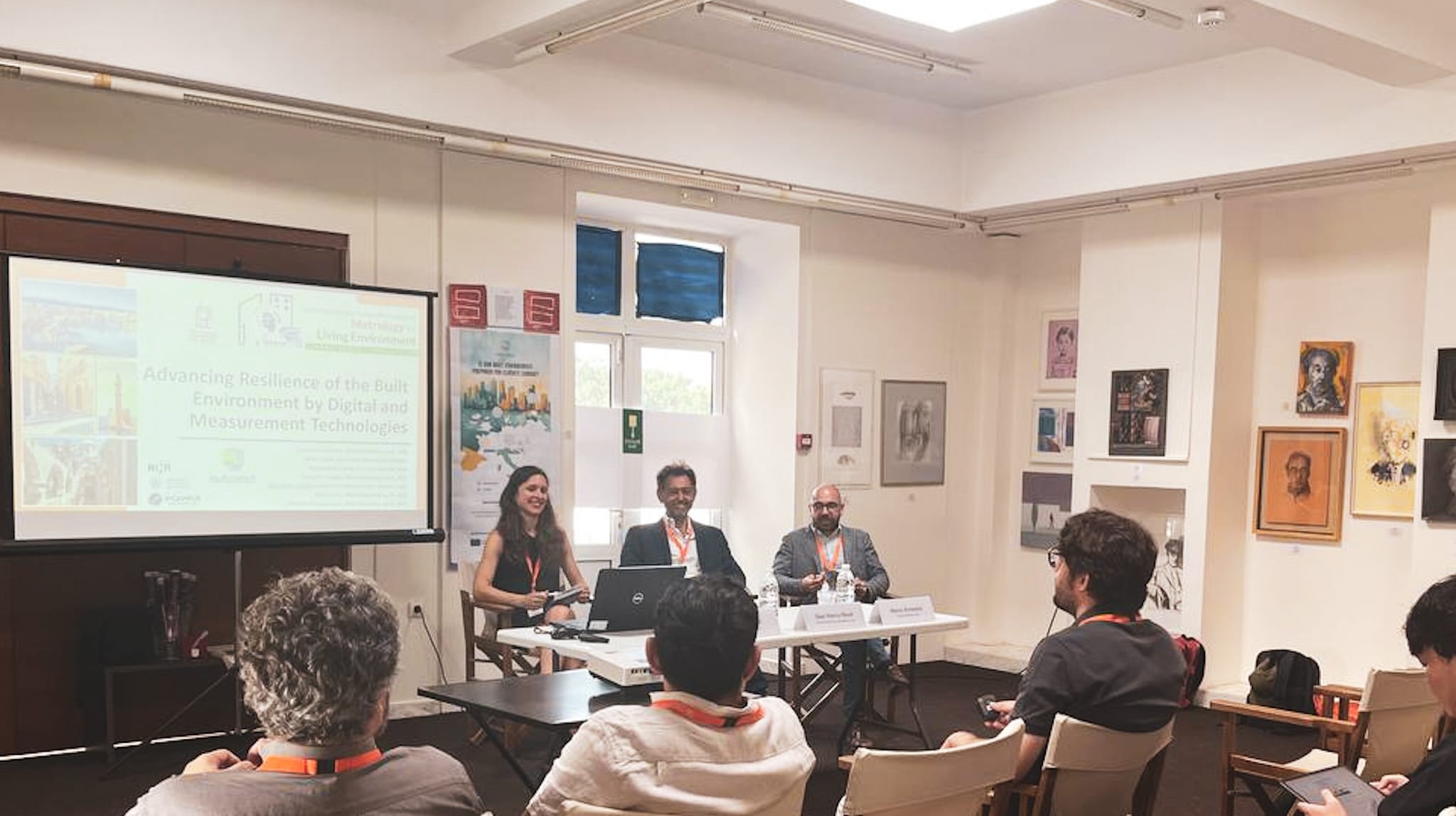
Pioneering the Future of Built Environment Monitoring with MULTICLIMACT
MULTICLIMACT presented advancements in Building Information Modelling, sensors, and digital technologies for enhancing built environment resilience at IEEE MetroLivEnv 2024 in Greece. Zamora has won the Best Conference Paper Award. CRETE, Greece. 14 June 2024 – As part of the IEEE MetroLivEnv 2024 conference, held on June 12-14 in Chania, Crete, Greece, the MULTICLIMACT project…
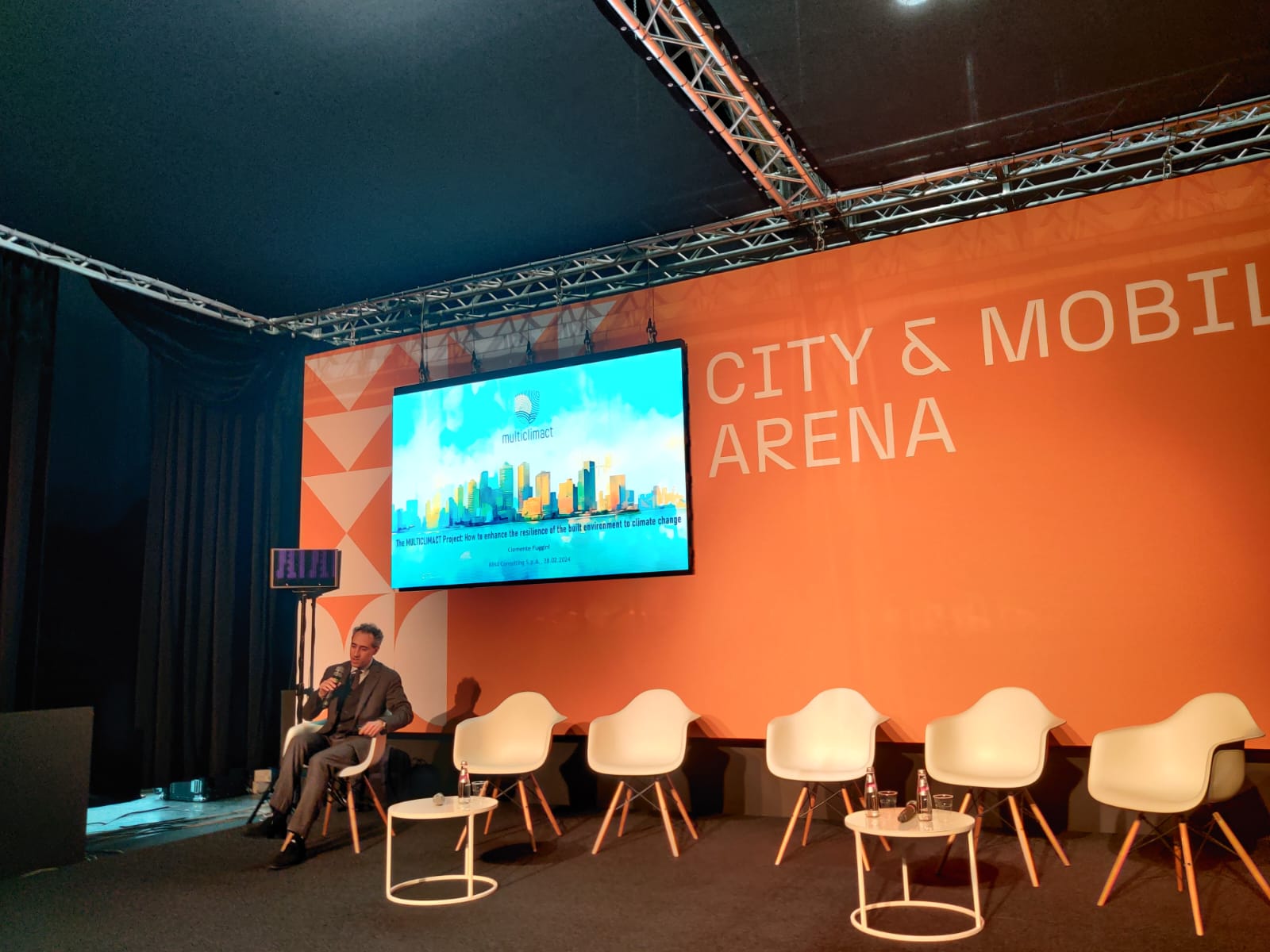
MULTICLIMACT Project Takes Center Stage at KEY Conference
Dr. Clemente Fuggini, coordinator of the MULTICLIMACT project, delivered a captivating address at the KEY Conference, focusing on enhancing resilience against climate change in the built environment. His insights illuminated the project’s pivotal role in driving sustainable innovation. RIMINI, Italy. 28 February 2024 – At the “Built4People” event hosted by the KEY Conference, the spotlight…
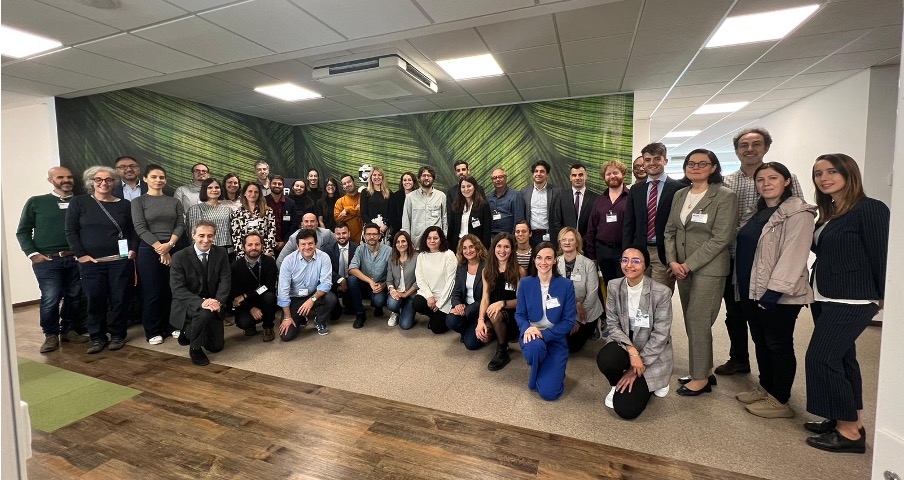
MULTICLIMACT: A Groundbreaking EU Initiative to Safeguard the Built Environment
23 European organisations meet in Milan to launch the EU-funded project MULTICLIMACT, a novel European action to usher in a new era of resilience and sustainability against local natural and climatic hazards. MILAN, 25 October 2023 – Today marks the unveiling of an ambitious and innovative European project, MULTICLIMACT, designed to revolutionize the protection of…
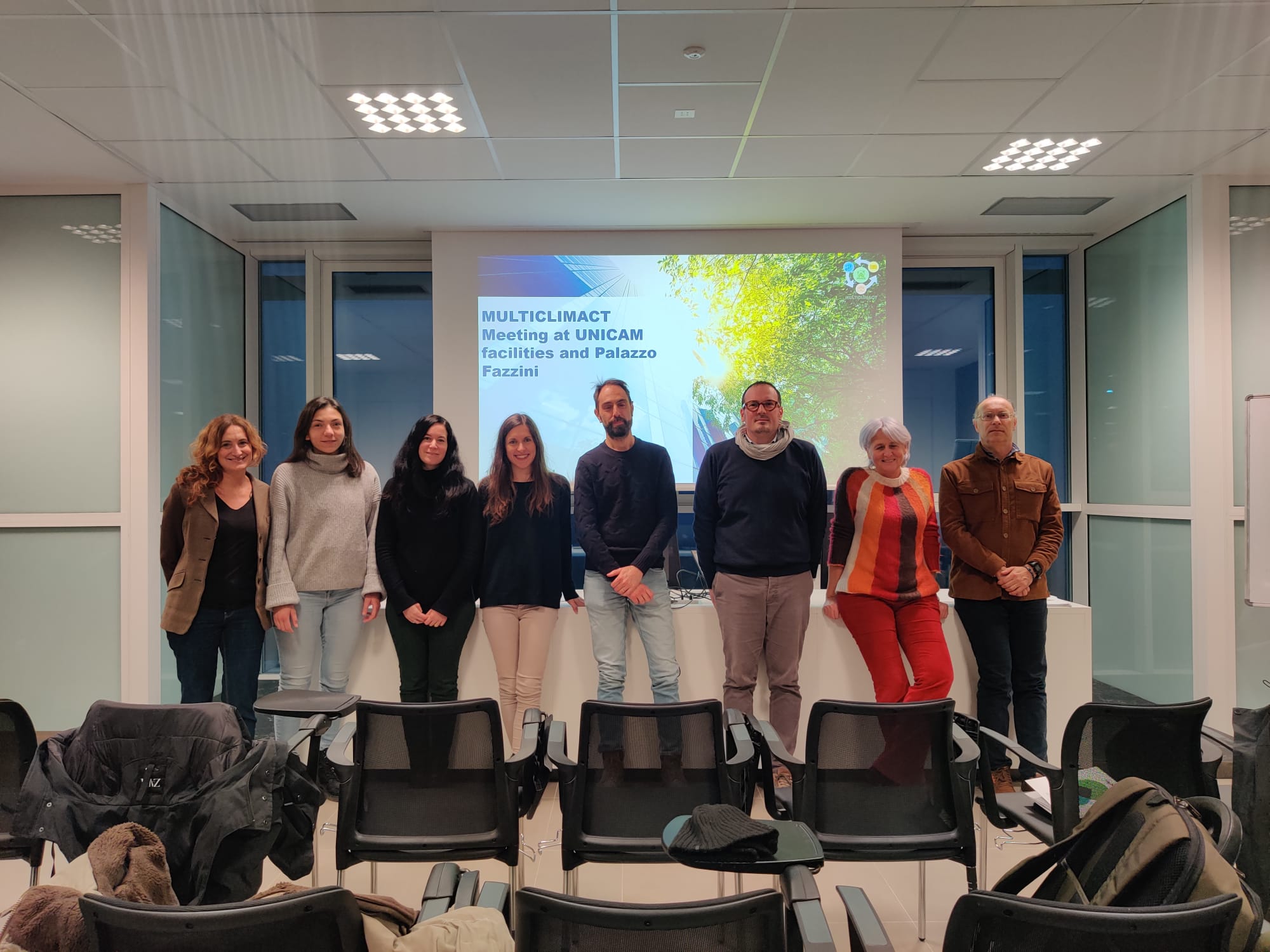
Materials and Sensing Technologies for Building Resilience Planned at MULTICLIMACT Meeting
MULTICLIMACT partners focusing on innovative materials and sensing solutions. Vibrant discussions and site visits underscored their commitment to advancing sustainable technologies. CAMERINO, Italy. 10 January 2024 – A collaborative effort to advance structural health monitoring technologies took place at the University of Camerino (UNICAM) facilities as part of the MULTICLIMACT project. Representatives from UNICAM, Marche…
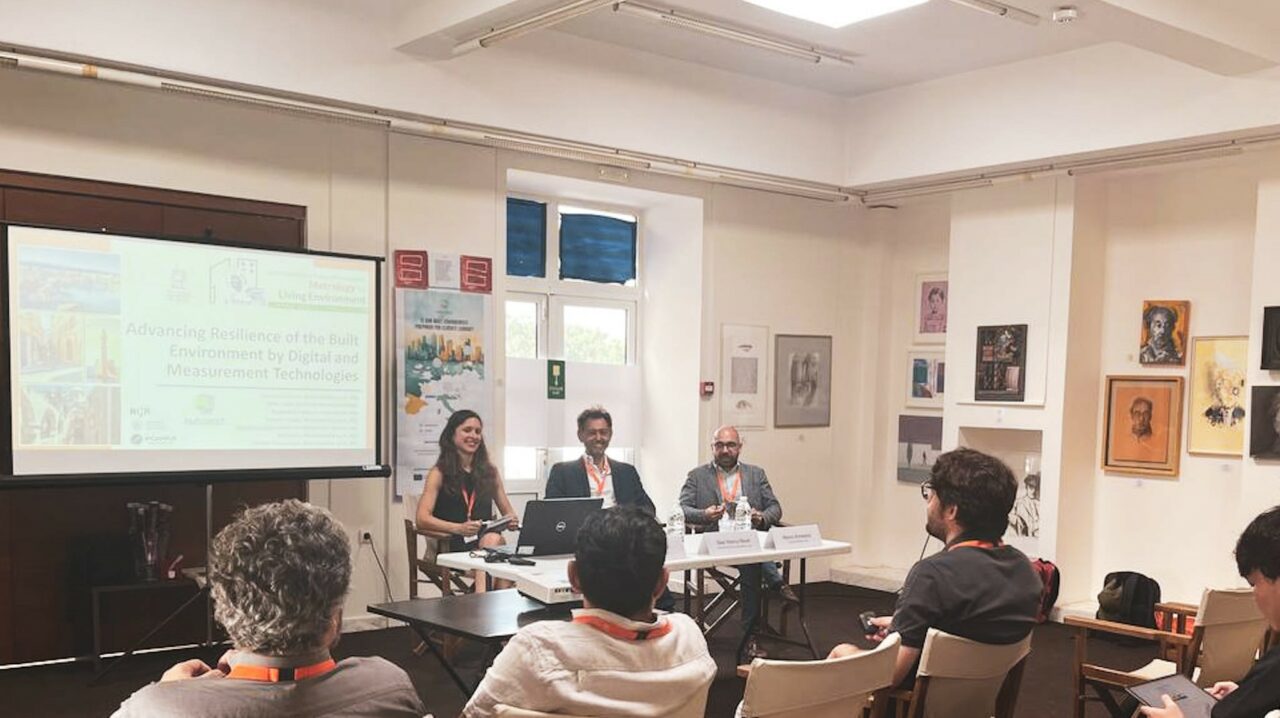
19. Juni 2024
Pioneering the Future of Built Environment Monitoring with MULTICLIMACT
MULTICLIMACT presented advancements in Building Information Modelling, sensors, and digital technologies for enhancing built environment resilience a […]
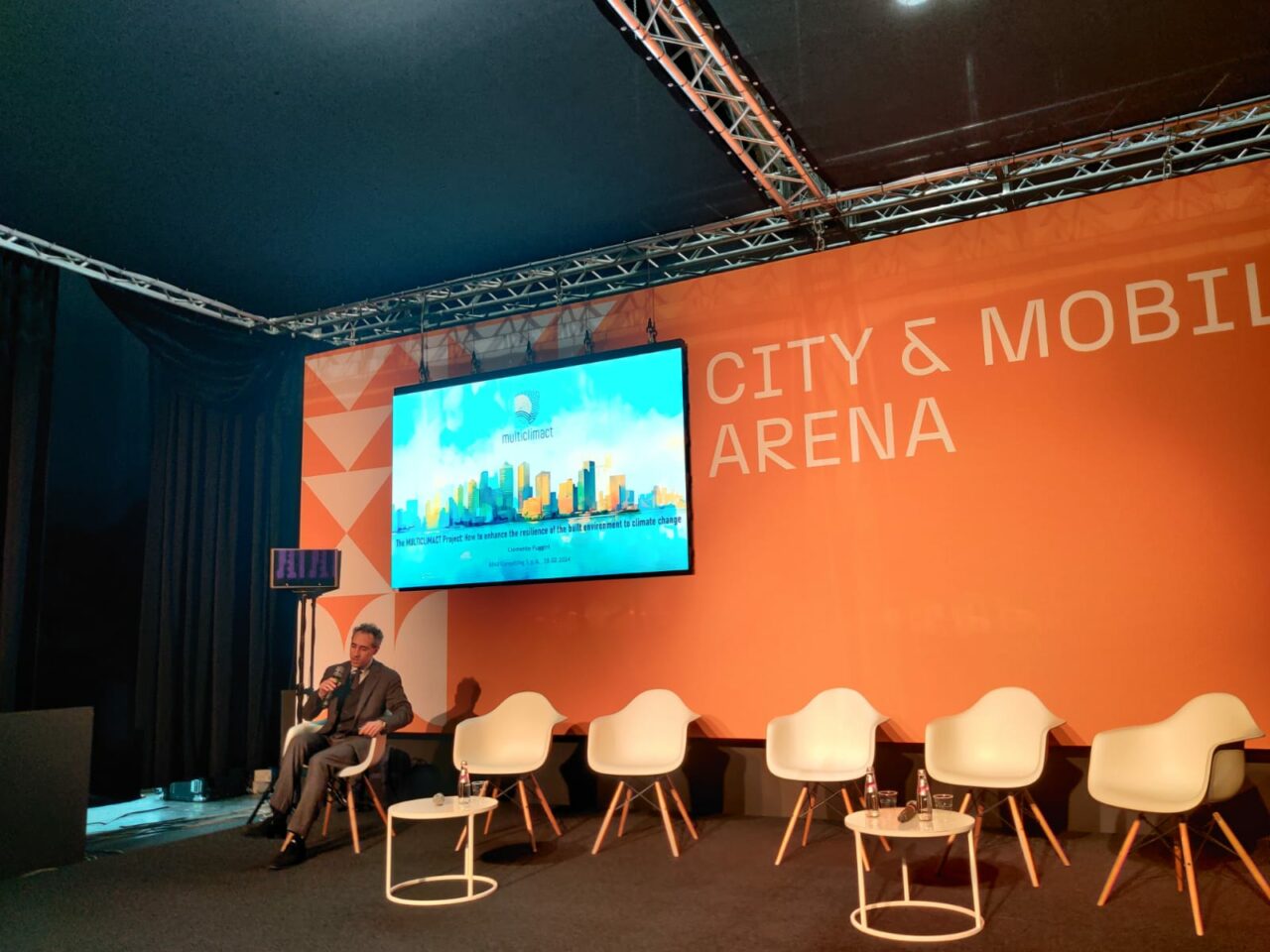
28. Februar 2024
MULTICLIMACT Project Takes Center Stage at KEY Conference
Dr. Clemente Fuggini, coordinator of the MULTICLIMACT project, delivered a captivating address at the KEY Conference, focusing on enhancing resilienc […]

19. Februar 2024
MULTICLIMACT: A Groundbreaking EU Initiative to Safeguard the Built Environment
23 European organisations meet in Milan to launch the EU-funded project MULTICLIMACT, a novel European action to usher in a new era of resilience and […]

19. Februar 2024
MULTICLIMACT: A Groundbreaking EU Initiative to Safeguard the Built Environment

19. Februar 2024
MULTICLIMACT: A Groundbreaking EU Initiative to Safeguard the Built Environment
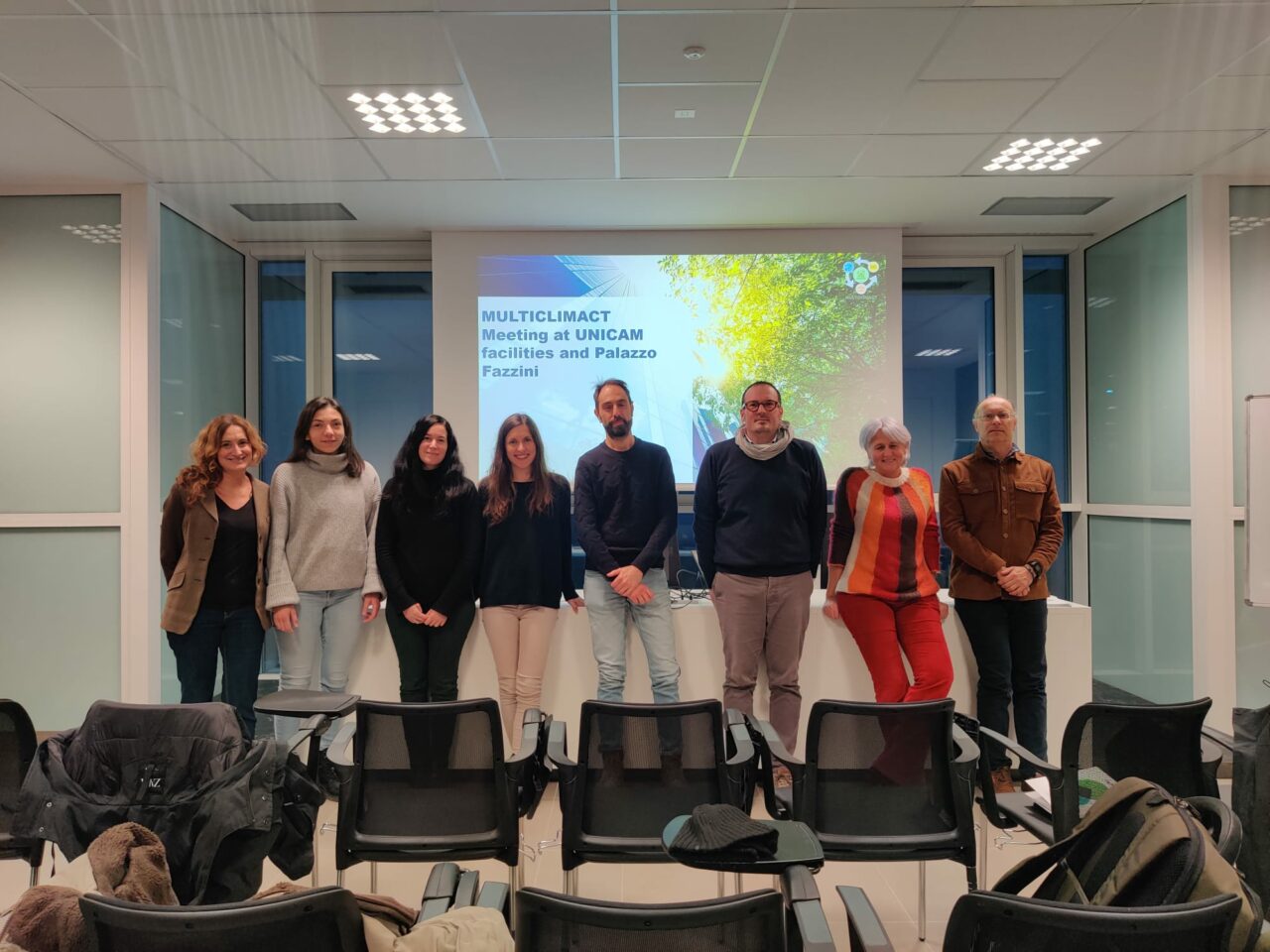
10. Januar 2024
Materials and Sensing Technologies for Building Resilience Planned at MULTICLIMACT Meeting
MULTICLIMACT partners focusing on innovative materials and sensing solutions. Vibrant discussions and site visits underscored their commitment to adv […]

10. Januar 2024
Materials and Sensing Technologies for Building Resilience Planned at MULTICLIMACT Meeting

10. Januar 2024
Materials and Sensing Technologies for Building Resilience Planned at MULTICLIMACT Meeting
Das perfekte Formular
mit GREYD.Forms
Der integrierte Formulargenerator der GREYD.SUITE enthält alles, was du für professionelle Formulare benötigst:
Natives Double Opt-in
Schnittstellen zu CRMs, Newsletter Tools, Zapier & Co.
Bildkacheln, Multistep & weitere Conversion Booster
Conditional Content für deine Kampagnen
Mathematische Funktionen
Folgeaktionen, Emails & Einträge übersichtlich im Backend
Du interessierst die für weitere Themen oder hast Fragen zur GREYD.SUITE?
Subscribe to our newsletter

MULTICLIMACT is a Horizon Europe project supported by the European Commission under grant agreement No 101123538. Views and opinions expressed are however those of the author(s) only and do not necessarily reflect those of the European Union. Neither the European Union nor the granting authority can be held responsible for them. All information in this deliverable may not be copied or duplicated in whole or part by any means without express prior agreement in writing by the MULTICLIMACT partners. All trademarks and other rights on third party products mentioned in this document are acknowledged and owned by the respective holders. The MULTICLIMACT consortium does not guarantee that any information contained herein is error-free, or up to date, nor makes warranties, express, implied, or statutory, by publishing this document.
© 2024 MULTICLIMACT Consortium Partners. All rights reserved.
